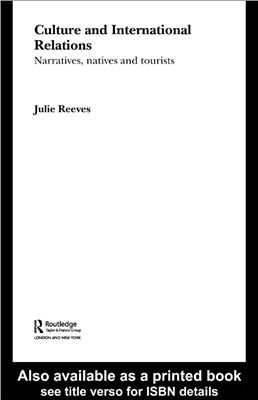Routledge, 2004. 221 p.
Culture is a popular and powerful, though often unacknowledged, idea in inteational relations. However, where it was once used to foster mutual understanding, in the post-Cold War era it became synonymous with ways of life that clashed.
Culture and Inteational Relations: Narratives, natives and tourists provides an historical survey of the development of the idea of culture from the perspective of inteational relations (IR). It crucially demonstrates that, far from being a neglected subject in IR, culture has been important
throughout the discipline’s history. The author identifies two distinct concepts of culture – the humanist and the anthropological – and uses a contextual methodology to track its changing meaning across the twentieth century from cultural inteationalism to the clash of cultures.
This innovative volume examines the implications of culture for IR and controversially challenges the current dominant ideology of culture in inteational relations, arguing that – contrary to popular belief, and some prominent inteational theory – it is not obvious that everyone has culture or even that culture exists. Throwing light on how we should think about people and their differences in the contemporary world, this book will be relevant to everyone working in inteational relations.
The civilizing mission of culture
Cultural inteationalism
The ever disappearing native
The nationalization of culture
Inteational cultural society
Strategies, civilizations and difference
Conclusion: fates and futures
Culture is a popular and powerful, though often unacknowledged, idea in inteational relations. However, where it was once used to foster mutual understanding, in the post-Cold War era it became synonymous with ways of life that clashed.
Culture and Inteational Relations: Narratives, natives and tourists provides an historical survey of the development of the idea of culture from the perspective of inteational relations (IR). It crucially demonstrates that, far from being a neglected subject in IR, culture has been important
throughout the discipline’s history. The author identifies two distinct concepts of culture – the humanist and the anthropological – and uses a contextual methodology to track its changing meaning across the twentieth century from cultural inteationalism to the clash of cultures.
This innovative volume examines the implications of culture for IR and controversially challenges the current dominant ideology of culture in inteational relations, arguing that – contrary to popular belief, and some prominent inteational theory – it is not obvious that everyone has culture or even that culture exists. Throwing light on how we should think about people and their differences in the contemporary world, this book will be relevant to everyone working in inteational relations.
The civilizing mission of culture
Cultural inteationalism
The ever disappearing native
The nationalization of culture
Inteational cultural society
Strategies, civilizations and difference
Conclusion: fates and futures

